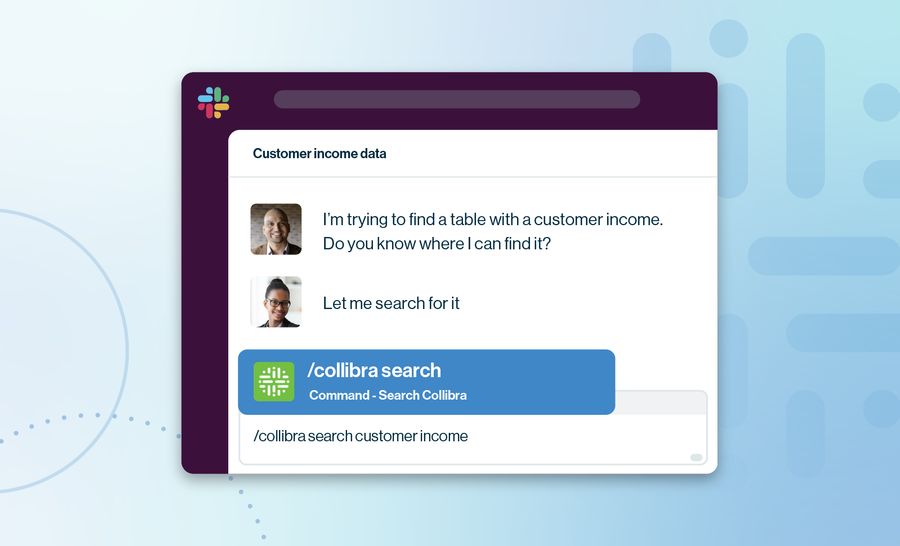Why is data governance important?

Data governance gives your data meaning, builds trust, and fosters understanding through stewardship and a strong business glossary, accelerating digital transformation.
Why is data governance important?
Data governance is about managing data and processes so data can be used as a consistent, secure and organized asset that meets policies and standards. Effective, enterprise-grade data governance does the following:
- Breaks down departmental silos
- Determines policies
- Supports the data stewardship process
- Shows how data is organized
- Aligns terms across the organization
- Connects technical databases and those terms.
Data governance is important because it goes beyond data management or master data management; it allows data citizens to access the right information and extract value from the data.
What are the benefits of data governance?
Effective data governance delivers value to all team members across various use cases. Data governance helps you:
Create a shared language for collaboration
Data governance allows teammates across departments to define business terminology, KPIs, rules, policies and more so everyone in the organization speaks the same language. By creating this shared language, organizations build a common understanding and leverage the same, consistent and trusted information. Additionally, clarifying roles and responsibilities eliminates confusion and makes data processes and collaboration easy to follow.
Improves data quality
Data governance brings context to an organization’s data.It enables teams to organize, document and evaluate the quality of available information assets. By defining terminologies, establishing controls, identifying responsibilities, and more, data governance makes sure all teammates have the context they need to trust data, access data, and develop valuable insights.
Ensures regulatory compliance
Privacy laws, such as the European GDPR and California's COPPA, require organizations to be mindful about how they process user data and, in the case of children, how they should obtain consent before collecting that information. Many industries have their own specific rules and regulations relating to how data is collected, processed and shared. The need for data governance in health care, military and government-related organizations or others with strict compliance requirements is clear.
Improves efficiency
The power of analytics is one of the main reasons growing organizations are investing so heavily in data collection and analysis tools. Data governance is another part of the equation when it comes to supporting everything from predictive analytics to marketing. It helps reduce the likelihood of wasted marketing efforts, streamlines supply chains and facilitates more accurate decision-making.
Increases data quality
Missing, incorrect, duplicate or outdated information can easily lead to wasted time and effort or, in some cases, legal issues and reputational damage. Using data governance software to audit and maintain the quality of the data your organization is working with helps maintain more accurate and useful records.
Tightens data security
Data exfiltration, unauthorized access by internal employees and security breaches are all serious threats faced by modern organizations. The use of AI models presents a fresh attack surface for malicious actors and is something many IT teams don't have a lot of experience with. Modern data governance platforms help organizations identify and address potential security hazards, helping companies build trust among their users.
Offers great ROI
The up-front cost of data governance strategies should quickly be offset by the practice's numerous benefits. By improving efficiency, supporting better decision-making and reducing the risk of legal and compliance issues, effective data governance helps companies retain or build a competitive edge.
Building trust with consumers and suppliers is essential in today's competitive business world. Having a clear data governance strategy assists with that. It helps businesses avoid common data-related challenges and ensures that if something does go wrong, the organization is well-equipped to respond to the issue, communicate with those affected and put things right.
Enhances decision-making
From predictive maintenance and automatic stock management to providing advice to managers, data-driven decision-making is something that's being used in numerous ways, across all industries. Without access to high-quality data, it's difficult to make informed decisions. Data governance products help address some of the most common issues with the data businesses collect, such as duplicate records, obsolete records or information that's inconsistent.
Data governance systems may also include tools to assist with data integrity. This helps ensure that the data being collected is accurate, timely and accessible in a convenient, reliable format.
Manages risk better
Whenever an organization is collecting data, there's some risk associated with holding and processing that information. From complying with regulations to ensuring data is managed correctly, data governance solutions help organizations identify and manage risks appropriately.
A data governance strategy would ideally cover security, regulatory compliance and data quality, helping organizations avoid many of the pitfalls associated with data collection, both for traditional analytics and for AI purposes.
What are the challenges of data governance?
Even in organizations that understand the need for data governance, getting such a project off the ground can be difficult.
Not enough buy-in
Earning buy-in at the executive level and among key stakeholders is a challenge with any major change, particularly with something as compliance-focused as data governance. Employing effective change management techniques during the planning stages of a data governance project could help ensure success.
Initial investment
For many organizations, the initial investment in data governance software and training can seem significant. However, in the long term, the ROI offered by effective, compliant data governance systems is worthwhile. It offers organizations the chance to improve their security, build trust with users and increase their efficiency.
More access requests to manage
Enforcing the principle of least privilege and ensuring employees have access only to the materials they need to do their jobs is a core part of data governance. Managing access requests in a large organization can be time-consuming, especially for those using legacy systems who have yet to implement modern data governance tools.
Factoring in governance for AI
Artificial Intelligence further muddles the waters by presenting new concerns about transparency, accountability, security and privacy. It's important to implement a specific AI governance strategy that lays out how to handle these issues, ensuring safe, privacy-respecting and unbiased AI that both users and employees can trust.
How to create a data governance plan
Now that you understand the importance of data governance, you need to understand how to put it into practice. As you begin to develop your strategy, you should consider the following steps:
1. Acknowledge the disconnect between IT and the business.
Although IT supports your data needs as custodians, the business knows its data the best and is able to explain how supply chain, P&L results, and other business reports drive real business results.
In many cases, your IT organization should help the business by empowering end users to use technology platforms and enable self-service, rather than creating or managing data assets, terms, spreadsheets, and reports for departments. The amount of data a successful organization leverages on a daily basis should be exponentially beyond the capabilities of employees that support your IT tools.
When the lines of business are able to create and define their own terms and data flows in a system of record, they will be able to better realize their efficiencies (or inefficiencies) and solve their own business problems faster.
2. Articulate the value of data governance to business users
If your business users continue to see data governance as an IT issue, clarify the value that high quality and accessible data can bring to all units of the business. Estimate and communicate the ROI of a data governance program so the benefits feel more real to them. Consider sharing how there are varying advantages for different teams:
- Sales and marketing – Increase sales by using higher quality data to create more targeted campaigns
- Procurement – Reduce costs by using governed data to optimize purchasing processes and supply chain
- Legal and compliance – Avoid non-compliance, breaches, and fines by establishing ownership and policies around data.
- Finance – Improve reporting with better governed and easily accessible data.
3. Implement technology strategically
The reality is there are many great technologies that leverage new capabilities to discover data and tag terms to accelerate the heavy lifting of data recognition. However, at the end of the day, the bottom-up approach must be verified by the respective business owners and stewards. In many cases, unique business processes often become exceptions – requiring human interactions anyway. A growing company that wants to accelerate its profits and reduce its risks will often outsmart the structured environments that automation often relies on.
- Can any technology accurately detect dynamic changes in business workflows between business units, legal, privacy, compliance, HR, vendors, or suppliers?
- How is the flow of information recorded by your organization today to make intelligent decisions on how information should flow tomorrow?
People are at the center of these business-driven decisions, and technology should be leveraged to assist in recording human processes, not solely depended upon for innovation or decision making.
Why will the importance of data governance increase in the future?
It’s undeniable that data governance is here to stay, for the simple reason that making business decisions based on data isn’t going anywhere. An increasing number of businesses are turning to data analytics to optimize their performance, but to get the best analysis out of your data, you need to be working with well-organized, clean data sets that every member of your organization can trust.
The importance of data governance will increase over time, as organizations must consider the following:
- More data is created and organizations get access to more data
- Data becomes more complex – and more types of data are created
- More technologies enter the market
- New methods for examining data emerge
- More regulations are put into law that organizations must be compliant with
Any forward-thinking organization that needs trustworthy data to make accurate, data-driven recommendations must consider how data governance can help them reach their goals.
Keep pace with change
Remember that data governance is not just a one-off project or program. Data needs to be dynamic. Data practices need to evolve as the company and market landscape evolve. Consistently check on the changing needs of business users. Invest in technology that automates data processes. Stay abreast of industry trends and ultimately remember the importance of data governance to accelerate digital transformation.
Related articles

Data GovernanceFebruary 14, 2025
Why we are the data and AI leader for you

Data GovernanceJuly 28, 2025
Your new shortcut to trusted data: Collibra’s two-way Slack Integration

Data GovernanceMay 24, 2022
The journey to data catalog and governance success: A customer perspective

Data GovernanceOctober 12, 2023
Improved user provisioning leads to calmer seas and smoother sailing
Keep up with the latest from Collibra
I would like to get updates about the latest Collibra content, events and more.
Thanks for signing up
You'll begin receiving educational materials and invitations to network with our community soon.
